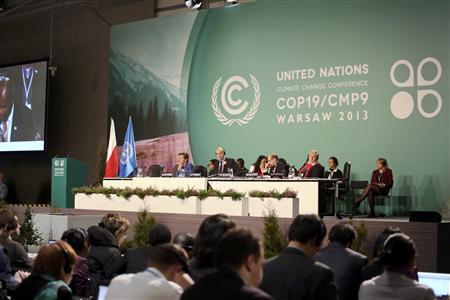Philippine delegate fasts at climate talks to urge action after storm
Date: 12-Nov-13
Country: POLAND
Author: ALISTER DOYLE AND MICHAEL SZABO

Delegates attend the 19th conference of the United Nations Framework
Convention on Climate Change (COP19) at the National Stadium in
Warsaw November 11, 2013.
Photo: AGATA GRZYBOWSKA/AGENCJA GAZETA
The Philippine delegate at U.N. climate talks began a fast on Monday in protest at a lack of action on global warming that he blamed for fuelling a super typhoon that has killed an estimated 10,000 people in his country.
Delegates from almost 200 nations held three minutes' silence to mourn victims of typhoon Haiyan, one of the most powerful storms ever recorded, at the start of November 11-22 talks to plan a U.N. deal in 2015 to slow climate change.
"I will voluntarily refrain from eating food (during the conference) until a meaningful outcome is in sight," Naderev Sano, the Philippines' Climate Commissioner, said of the devastation of Haiyan that, he noted, had left many hungry.
In line with many developing nations, he urged far tougher action to cut greenhouse gas emissions, led by the rich, and more funds to help the poor cope with the impacts of climate change, including a new mechanism for loss and damage.
"We can take drastic action now to ensure that we prevent a future where super typhoons become a way of life," he said, his voice choking with emotion. He won a standing ovation.
Many developed nations, however, are more concerned about their sluggish economies than taking radical steps on climate change. The United States and the European Union reaffirmed what they said were ambitious climate goals for 2020 that developing countries say fall far short of what is needed.
Emerging economies led by China, the top greenhouse gas emitter, and India say that rich countries must do more to cut emissions and allow developing nations to burn more fossil fuels to end poverty.
Climate scientists are usually reluctant to link greenhouse gases and single extreme events like a cyclone.
Krishna Kumar Kanikicharla, a senior author for the U.N.'s Intergovernmental Panel on Climate Change (IPCC), said the overall number of tropical cyclones may decline this century but such weather systems may get stronger. "Wind speed and the precipitation is likely to increase," he added.
SEA LEVEL RISE
The IPCC says that global warming, caused by a build-up of greenhouse gases from human activities, has caused a 20 cm (8 inch) average rise in sea levels over the past century that can aggravate storm surges. Warm air can also hold more moisture that can bring more downpours.
Many nations said the typhoon matched trends towards extreme weather and was an example to spur action in Warsaw, which is meant to lay down the outlines of a global deal in 2015 that will enter into force from 2020.
"This points us to the need for urgent action," Christiana Figueres, the U.N. climate chief, said of the devastation.
Separately, the IPCC said it was correcting some numbers for historical carbon emissions in a report to guide governments in switching to renewable energies, issued in September.
The numbers were revised up for cumulative emissions since 1750 and down for emissions since the late 19th century after the authors spotted inconsistencies.
"I don't see it as a significant change," IPCC chairman Rajendra Pachauri told Reuters. The panel had hoped to avoid corrections after an embarrassing error that exaggerated the rate of melt of Himalayan glaciers in its last report in 2007.
The United States said it was on track to reach a goal set by President Barack Obama to cut U.S. emissions by 17 percent below 2005 levels by 2020.
"With the new measures that we have in place, we have a good chance of achieving it and we are working very hard to do so," U.S. delegation chief Trigg Talley told a news conference.
The European Union also reaffirmed its goal of a 20 percent cut below 1990 levels by 2020, with an option of a 30 percent cut if other nations stepped up ambition.
Outside the conference hall, Polish riot police used rubber bullets to break up groups of masked far-right youths who threw firecrackers and set fire to parked cars during a nationalist march, unconnected with the talks, nearby.
(Editing by Robin Pomeroy)
![]()
© Thomson Reuters 2013 All rights reserved